
5 Characteristics Of Organized People
Here are 5 characteristics of organized people, all of which are learnable skills which you can acquire, so you can be organized too.

Have you ever looked at someone else and thought, "they're so organized, I wonder what their secret is?"
First, let me assure you that people try to put their best foot forward in public, so what you see, and what is really happening below the surface, may be completely different things.
On the other hand, there are some people who are just plain organized. As a person who, myself, strives toward being organized, but is by no means perfect, I've spent a lot of time trying to figure out what these organized people do -- what characteristics do they have that help them be this way?
Here are 5 characteristics I've observed. The best part about all of these traits is that you can learn to do them too!
Characteristic 1: Focus On Habits & Routines
Organized people tend to have set habits and routines, both within their home and within their lives.
What you need to know, though, is that these habits and routines didn't magically spring up, like these individuals knew what to do all along.
Instead, as these individuals identified problems or needs they were experiencing, they consciously developed these habits and routines over the years to address those concerns, or they were very lucky to have been modeled similar habits and routines that they adopted as their own, that still happen to work for them.
These routines and habits include such things as a morning routine, evening routine, and routines for things like laundry or cleaning the house, as well as routines for yourself like for exercise and self-care.
The reasons these habits and routines work so well is that these small steps, on their own, don't accomplish much, but organized people realize the power that comes from taking these small steps over and over again.
If you'd like to learn more about the power of routines, as well as some suggested habits and routines you can adopt for yourself, I'd suggest you start with a morning and evening routine. You can learn more here in the 52 Week Organized Home Challenge article all about adopting a morning and evening routine.

Characteristic 2: If At First You Don't Succeed Try, Try Again
The power of doing things over and over again is what leads me to the second characteristic of organized people -- they don't give up.
I don't know about you, but I have a tendency to make a plan, and try to work it, but when I miss a day, or mess up one time, I want to give up and quit completely, thinking I've failed. That's called all or none thinking, and while I tend to do this, I really try to recognize this tendency to put a stop to it.
The reason is that people who are truly organized don't fall into the all or nothing trap.
They still mess up at times, miss a day, or don't hit their goal. That happens to all of us. But people that are organized don't let that deter them.
Instead of messing up and then quitting they try again tomorrow, and over time the good days outnumber the bad and positive things start to happen.
This is often an issue people new to the Declutter 365 missions encounter -- they miss a day on the calendar, and then wonder if it's even worth it to continue. In this FAQ I've explained what to do when you miss a day of the missions, and how to get yourself ready to start again without quitting entirely. If you struggle with all or none thinking, check out the article for strategies and mindsets to avoid this trap.

Characteristic 3: Planning, Deadlines & Schedules
People that are organized plan ahead.
Planning ahead is so important to actually succeeding at anything in life, or in managing your home. That's because it's much easier to deal with planned tasks than unplanned emergencies.
It isn't that organized people don't have unplanned emergencies. We all do. No one can control everything.
But what organized people don't do is make emergencies for themselves. For example, it should come as no surprise that everyone in your household wants to eat dinner each evening, even on nights you are scheduled to work late. So an organized person has planned for this, by arranging that someone else in the household will cook dinner, or instead they use their meal plan to know that this morning they should throw something into the crockpot that will be ready later, without a lot of preparation after a busy day.
A bit of prior planning keeps this type of emergency from happening.
Another way of saying this, is to "do something today that your future self will thank you for." Organized people try to be kind to their future self, doing tasks in the present, when they're small, to make life easier on their future self. This frees up time for their future self, which can keep the virtuous cycle going, because then your future self will find it easier to do more tasks that your even more future self will also thank you for.

Similarly, organized people also make deadlines for themselves, and set schedules to get items accomplished.
This characteristic keeps things moving forward in their lives without having to rush, all at the end, to get something accomplished. And this, in itself, also prevents many emergencies from occurring because nothing gets too far behind.
There are lots of tasks you can start with, that help you learn the characteristic of using planning, deadlines and schedules, but one that incorporates all of these into one task, and really does make a very positive impact on your life immediately, is the task of meal planning. If you're ready to learn this skill check out the 52 Week Organized Home Challenge all about healthy meal planning here.

Characteristic 4: Do One Task At A Time, In Small Steps When Necessary
While organized people do get quite a bit accomplished they don't actually do it in the way you might imagine.
Instead of multitasking, the most efficient and organized people actually focus on doing one task at a time.
This may seem counterintuitive, but focusing on one discrete task and getting it done completely, or at least getting one small step of it done, and cleaning up, before moving on to the next task, actually takes less time than switching between two tasks, back and forth, back and forth.
There are many advantages of single-tasking, instead of multi-tasking, and of doing things in small, manageable steps when the project is large or time-consuming. You're much more likely to succeed if you take small steps, one at a time, for almost anything you tackle.
You can learn more about the power of decluttering in small steps here, as just one example.
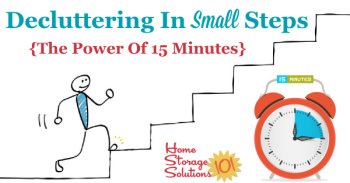
Characteristic 5: Take Steps To Maintain Organization
Finally, organized people not only get tasks accomplished incrementally, one small step at a time, but they recognize that even once the task is accomplished they've got to take some regular steps to maintain the organization achieved.
Fortunately, those steps to maintain organization are much easier and less time consuming than the original organizational task, and so once it is organized just a little bit of maintenance work will keep it that way, and let organized people reap the large rewards from their organizational effort.
That's why organized people continue with their habits, routines, planning and scheduling, even once the project is initially completed.
These routines, schedules, and habits allows them to maintain the organization they've achieved and continue to move forward, improving various areas of their home and life as they go, instead of having to rework and fix things they'd already addressed in the past over and over again.
There are a lot of examples of routines designed to maintain organization, and one of the core ones I focus on is the daily tidy up routine.
That's because along with regularly removing unwanted or unneeded clutter from your home, you've also got to take the time to put away the stuff that you are using each day, and therefore isn't clutter, but does need to be put back into its proper place. You can learn more about this daily tidy up routine here.

Those are five of the characteristics of organized people that I know are important, but are there more? I'd love to hear your thoughts about additional characteristics below, in the comments.
If You Haven't Already, Join The 52 Week Organized Home Challenge & Start Organizing Your Home & Life Today!
If you haven't already, make sure to join the 52 Week Organized Home Challenge here (it's FREE!), and get started organizing your home and life today.
This free challenge is designed to help you start at any point in your home, organizing various rooms or areas of your life, one week at a time. We go slowly, week by week, so you can learn the organization skills, habits and routines necessary for each week's tasks. Then, at the end of a year's period you will have organized your entire home, as well as gained the skills necessary to maintain and keep it that way, from now on!

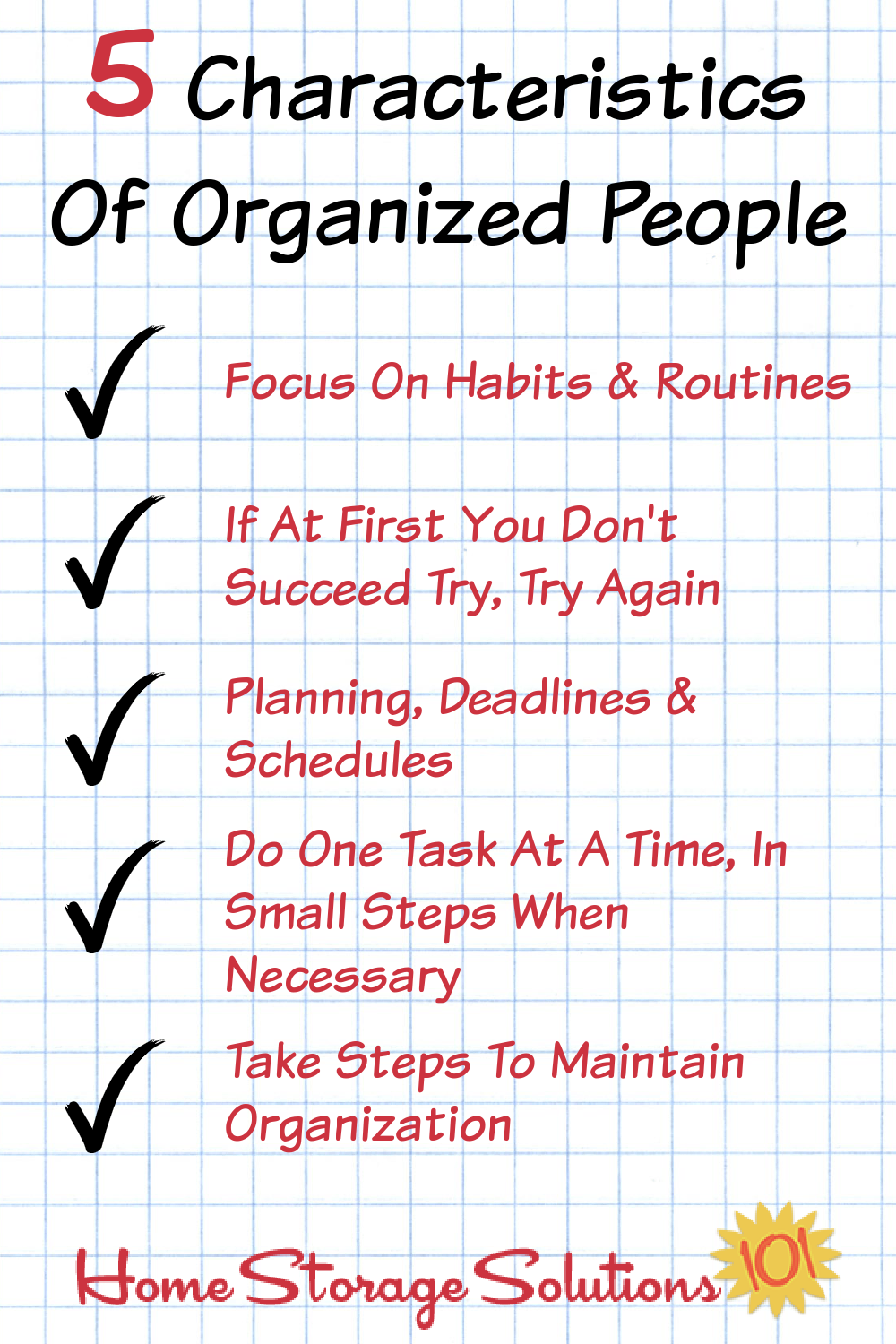
Some links on this page are affiliate links, meaning that if you purchase a product through them I receive a small commission which helps me provide this information to you for free, plus support my family. My integrity and your satisfaction are very important to me so I only recommend products I would purchase myself, and that I believe would benefit you. To learn more please see my disclosure statement.

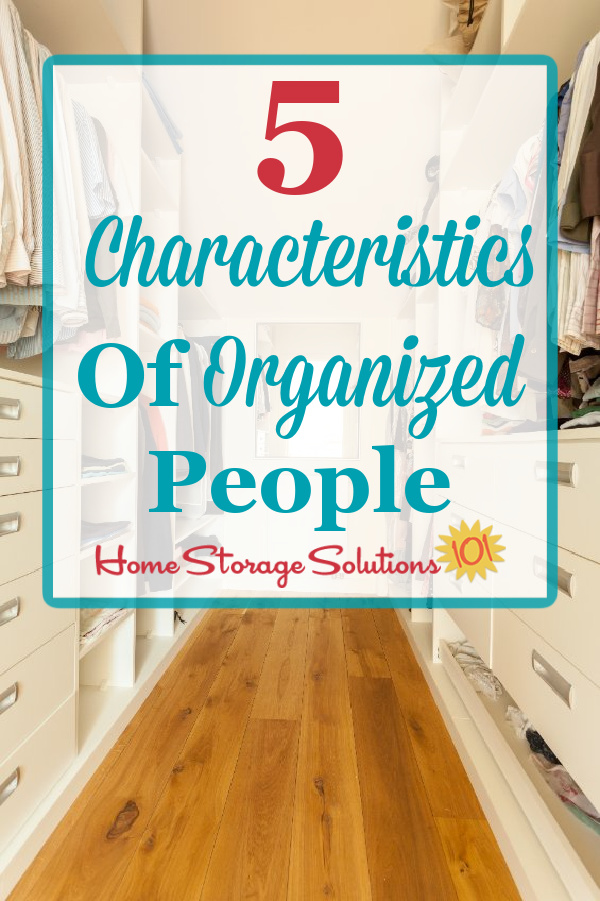
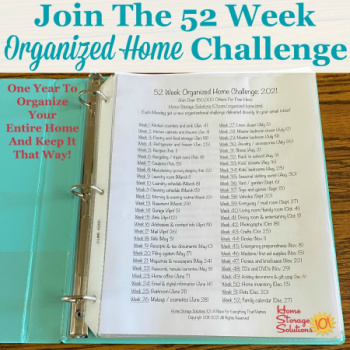
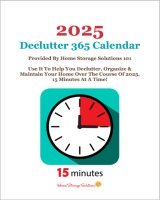

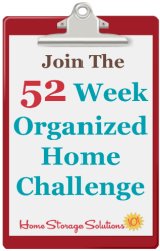



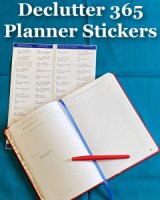
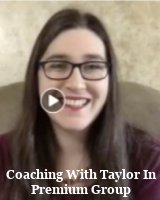




Share Your Comments, Tips & Ideas
I would love to hear from you, sharing your thoughts, questions, or ideas about this topic, so leave me a comment below. I try to always respond back!